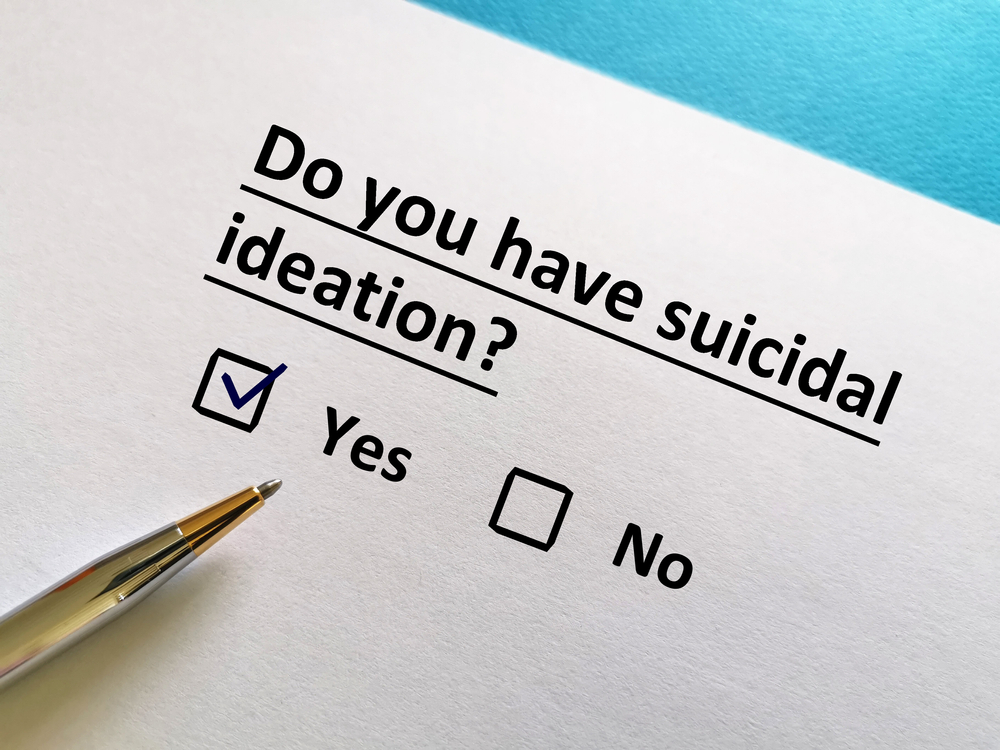Learning that a loved one is thinking about suicide can be scary.
While we must take these thoughts seriously and take action in finding the appropriate treatment, it’s important to understand the difference between suicidal ideation and suicidal intent.
Suicidal ideation is simply having thoughts about suicide, while suicidal intent indicates a clear plan and desire to complete suicide. If someone you know is exhibiting signs of either, it’s vital to get them professional help immediately.
What is suicidal ideation?
Suicidal ideation is any thought about suicide, regardless of how fleeting or persistent it may be. This can range from a casual thought such as “I wish I were dead” to more detailed fantasies or thoughts about how they die, what life would be like for people without them, and what their legacy would be. The DSM describes suicidal ideation as “recurrent thoughts that are focused on active plans to kill oneself.”
How prevalent is suicidal ideation?
Suicidal ideation is not uncommon:
- 11.83% of young adults aged 18-25
- 18.8% of high school students
- 42% of LGBTQ youth
- 52% of LGBTQ youth that identify as non-binary or transgender
It is estimated by the Center for Disease Control and Prevention (CDC) that in 2017 there were approximately 10 million people in the USA who experienced suicidal thoughts.
This means that suicidal ideation is actually quite common and does not necessarily indicate that a person is in danger of harming themselves. It is estimated that in 2017 there were 1.4 million suicide attempts in the USA.
Does having suicidal thoughts predict death by suicide?
Fortunately, the majority of ideators in the USA and globally will never attempt suicide, and fewer will use lethal means that result in death. Studies have shown that 2 – 3% of individuals who experience Suicidal Ideation will go on to die by suicide. However, this does not mean that suicidal ideation should be ignored or taken lightly.
What is suicidal intent?
Suicidal intent refers to a clear desire and plan to complete suicide. This may be accompanied by specific steps taken to prepare for suicide, such as obtaining the means to do so, writing goodbye letters, or making final arrangements. DSM-5 specifies that “the person must have made active preparations for death (e.g., collecting pills, buying a gun, researching methods).” It’s important to remember that suicidal ideation and intent can be fluid; someone who is only thinking about suicide may develop intent, and vice versa.
What are the signs of suicidal ideation?
There are several warning signs that someone may be experiencing suicidal thoughts. These include expressing feelings of hopelessness or being a burden to others, talking about wanting to die or hurt oneself, withdrawing from friends and activities, expressing unusual anger or rage, and giving away prized possessions.
If you are worried that someone you know is exhibiting signs of suicidal ideation or intent, it’s important to get them professional help immediately. Suicide is a preventable problem, but it requires intervention from trained professionals to ensure the safety of those at risk.
What are the signs of suicidal intent?
In addition to the signs of suicidal ideation, there are several warning signs that someone may be planning to attempt suicide. These include making final arrangements such as writing a will, putting affairs in order, or giving away possessions; expressing a sense of calm or peace after making plans; and increasing drug or alcohol abuse.
Why it’s important to get professional help immediately if someone you know exhibits either of these signs
Only 31% of those who complete suicide receive mental health services in the year prior to their suicide. If someone you know is exhibiting signs of suicidal ideation or intent, it’s important to get them professional help immediately. Suicide is a preventable problem, but it requires intervention from trained professionals to ensure the safety of those at risk. Early intervention can make all the difference in helping prevent suicide. If you or a loved one requires immediate support, please dial 988 to reach the nationwide Suicide Prevention Lifeline.
Further Information and Support
For most of us, life can be very stressful, leading us to feel emotionally charged, which can cause anxiety, panic attacks, depression, and getting stuck in a cycle of being burdened with negative thoughts. Navigating through the challenges and emotional turmoil of life can be overwhelming, but you do not have to go through it alone. Engage Treatment is a Joint Commission Accredited professional psychological practice. We specialize in treating children, teens, and young adults struggling with depression and anxiety through community-focused treatment plans that incorporate a carefully selected combination of therapeutic interventions. Our compassionate, multidisciplinary practitioners are devoted to providing the highest quality of care that helps ignite positive change and enables clients to reach optimal health and well-being. Please do not hesitate to reach out for guidance. We are happy to answer questions and provide you with any additional information. Feel free to call us at 805-497-0605 or email us at [email protected]. You are also welcomed to get in touch by filling out our contact form. We look forward to connecting and having the opportunity to discuss how we might best be able to support you.
Contact Us
Westlake Campus:
IOP Program
2625 Townsgate Road, Suite 210
Westlake Village, California 91361
Agoura Campus:
Private Therapy & Parenting Program
30300 Agoura Road, Suite 250
Agoura Hills, CA 91301
805-497-0605
805-371-4862











© 2023 Engage Treatment Program, Inc. All Rights Reserved.
LGBTQ Friendly
About
• About Engage
• Our Team
• Career Opportunities
• Individual / Family Therapy
Resources
• Community Resources
• Blog
• FAQ
• Referring Clinicians
• Privacy Policy & SMS Terms






